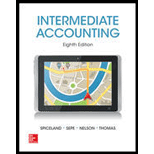
INTERMEDIATE ACCOUNTING
8th Edition
ISBN: 9780078096488
Author: SPICELAND
Publisher: MCG
expand_more
expand_more
format_list_bulleted
Textbook Question
Chapter 16, Problem 16.30E
FASB codification research
• LO16–5, LO16–8, LO16–10
Access the FASB Accounting Standards Codification at the FASB website (www.fasb.org). Determine the specific citation for accounting for each of the following items:
- 1. The specific items to which income tax expense is allocated for intraperiod tax allocation.
- 2. The tax rate used to calculate
deferred tax assets and liabilities. - 3. The required disclosures in the notes to financial statements for the components of income tax expense.
Expert Solution & Answer
Want to see the full answer?
Check out a sample textbook solution
Students have asked these similar questions
Answer? ? Financial accounting
General Accounting question
Monatana company produces basketballs
Chapter 16 Solutions
INTERMEDIATE ACCOUNTING
Ch. 16 - Prob. 16.1QCh. 16 - A deferred tax liability (or asset) is described...Ch. 16 - Prob. 16.3QCh. 16 - Prob. 16.4QCh. 16 - Temporary differences result in future taxable or...Ch. 16 - Identify three examples of differences with no...Ch. 16 - The income tax rate for Hudson Refinery has been...Ch. 16 - Suppose a tax reform bill is enacted that causes...Ch. 16 - A net operating loss occurs when tax-deductible...Ch. 16 - Prob. 16.10Q
Ch. 16 - Additional disclosures are required pertaining to...Ch. 16 - Additional disclosures are required pertaining to...Ch. 16 - Prob. 16.13QCh. 16 - Prob. 16.14QCh. 16 - IFRS and U.S. GAAP follow similar approaches to...Ch. 16 - Temporary difference LO161 A company reports...Ch. 16 - Prob. 16.2BECh. 16 - Temporary difference LO162 A company reports...Ch. 16 - Prob. 16.4BECh. 16 - Prob. 16.5BECh. 16 - Valuation allowance LO162, LO163 At the end of...Ch. 16 - VeriFone Systems is a provider of electronic card...Ch. 16 - Temporary and permanent differences; determine...Ch. 16 - Calculate taxable income LO161, LO164 Shannon...Ch. 16 - Prob. 16.10BECh. 16 - Change in tax rate LO165 Superior Developers...Ch. 16 - Net operating loss carryforward LO167 During its...Ch. 16 - Net operating loss carryback LO167 AirParts...Ch. 16 - Tax uncertainty LO169 First Bank has some...Ch. 16 - Intraperiod tax allocation LO1610 Southeast...Ch. 16 - Temporary difference; taxable income given LO161...Ch. 16 - Prob. 16.2ECh. 16 - Prob. 16.3ECh. 16 - Prob. 16.4ECh. 16 - Prob. 16.5ECh. 16 - Prob. 16.6ECh. 16 - Identify future taxable amounts and future...Ch. 16 - Calculate income tax amounts under various...Ch. 16 - Determine taxable income LO161, LO162 Eight...Ch. 16 - Prob. 16.10ECh. 16 - Prob. 16.11ECh. 16 - Prob. 16.12ECh. 16 - Prob. 16.13ECh. 16 - Prob. 16.14ECh. 16 - Prob. 16.15ECh. 16 - Prob. 16.16ECh. 16 - Prob. 16.17ECh. 16 - Prob. 16.18ECh. 16 - Prob. 16.19ECh. 16 - Prob. 16.20ECh. 16 - Prob. 16.21ECh. 16 - Prob. 16.22ECh. 16 - Identifying income tax deferrals LO161, LO162,...Ch. 16 - Multiple temporary differences; balance sheet...Ch. 16 - E16–25
Multiple tax rates; balance sheet...Ch. 16 - Prob. 16.26ECh. 16 - Concepts; terminology LO161 through LO168 Listed...Ch. 16 - Tax credit; uncertainty regarding sustainability ...Ch. 16 - Prob. 16.29ECh. 16 - FASB codification research LO165, LO168, LO1610...Ch. 16 - Prob. 1CPACh. 16 - Prob. 2CPACh. 16 - Prob. 3CPACh. 16 - 4. Stone Co. began operations in 2016 and reported...Ch. 16 - Prob. 5CPACh. 16 - Prob. 6CPACh. 16 - Prob. 7CPACh. 16 - Prob. 1CMACh. 16 - Prob. 2CMACh. 16 - Prob. 3CMACh. 16 - Prob. 16.1PCh. 16 - Prob. 16.2PCh. 16 - Prob. 16.3PCh. 16 - Prob. 16.4PCh. 16 - Prob. 16.5PCh. 16 - Prob. 16.6PCh. 16 - Prob. 16.7PCh. 16 - Prob. 16.8PCh. 16 - P 16–9
Determine deferred tax assets and...Ch. 16 - Prob. 16.10PCh. 16 - Delta Air Lines revealed in its 10-K filing that...Ch. 16 - Prob. 16.12PCh. 16 - Prob. 16.13PCh. 16 - Prob. 16.1BYPCh. 16 - Prob. 16.2BYPCh. 16 - Prob. 16.3BYPCh. 16 - Prob. 16.4BYPCh. 16 - Prob. 16.5BYPCh. 16 - Prob. 16.6BYPCh. 16 - Research Case 166 Researching the way tax...Ch. 16 - Access the financial statements and related...Ch. 16 - Prob. 16.9BYPCh. 16 - Prob. 16.10BYPCh. 16 - Prob. 16.13BYPCh. 16 - Prob. 1AFKC
Additional Business Textbook Solutions
Find more solutions based on key concepts
A case study in this chapter discusses the federal minimum-wage law. a. Suppose the minimum wage is above the e...
Principles of Economics (MindTap Course List)
1-1. Define marketing and outline the steps in the marketing process. (AASCB: Communication)
Marketing: An Introduction (13th Edition)
Fundamental and Enhancing Characteristics. Identify whether the following items are fundamental characteristics...
Intermediate Accounting (2nd Edition)
• Illustrate and interpret shifts in the short-run and long-run aggregate supply curves.
Economics of Money, Banking and Financial Markets, The, Business School Edition (5th Edition) (What's New in Economics)
E6-14 Using accounting vocabulary
Learning Objective 1, 2
Match the accounting terms with the corresponding d...
Horngren's Accounting (12th Edition)
How is activity-based costing useful for pricing decisions?
Horngren's Cost Accounting: A Managerial Emphasis (16th Edition)
Knowledge Booster
Learn more about
Need a deep-dive on the concept behind this application? Look no further. Learn more about this topic, accounting and related others by exploring similar questions and additional content below.Similar questions
- Hi expert please help me this questionarrow_forwardRequired information Use the following information for the Exercises below. (Algo) [The following information applies to the questions displayed below.] On December 1, Jasmin Ernst organized Ernst Consulting. On December 3, the owner contributed $84,310 in assets to launch the business. On December 31, the company's records show the following items and amounts. Cash Accounts receivable $ 10,200 15,200 Office supplies 3,550 Land 45,990 Office equipment 18,310 Accounts payable Owner investments 84,310 8,740 Cash withdrawals by owner Consulting revenue Rent expense Salaries expense Telephone expense Miscellaneous expenses $ 2,340 15,200 3,910 7,350 790 610 Exercise 1-19 (Algo) Preparing a statement of owner's equity LO P2 Frnst Genculting Hint Jasmin Ernst Capitalonarrow_forwardHelparrow_forward
arrow_back_ios
SEE MORE QUESTIONS
arrow_forward_ios
Recommended textbooks for you






What is Fund Accounting?; Author: Aplos;https://www.youtube.com/watch?v=W5D5Dr0j9j4;License: Standard Youtube License